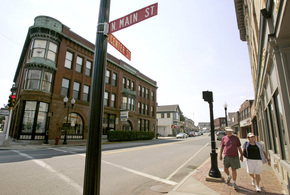
The last Census counted 23,116 souls there, making it the kind of place where restless youth may feel there is little to do but congregate downtown and in parks and throw vulgar terms through the air as though they were footballs.
It wasn’t close. The final vote was 183-50.
Take away the last zero of the tally and you have roughly the year to which some people think Middleborough has reverted, 1835. But lest people forget this really is the age of irony, the comment boards of virtually every news story on the subject were there as a stark reminder.
For many, the most intelligent rebuttal they could raise consisted of words with four letters. The Boston Globe went to the young people hanging out downtown and asked for their opinion.
“One thought it was [expletive]. Another thought it was [expletive expletive]. A car drove by and a young woman yelled out the window, ‘Is it illegal to say [expletive]?’
Irony. Get it?
One of the calmer responses to a blog on the subject at cafemom.com said, “When you can give me a real reason that those words are really so bad then I will take the law seriously. Words are words and there's no reasons(sic) these words should be considered any worse and therefore, it's people's attitudes that need to change, not language.”
Age of irony? Did I mention it’s also the age of meaningless relativism? If all words truly are equal, one wonders what the reaction would have been if congregating youths had been tossing racial hatred at the top of their lungs.
I am not going to attempt a legal analysis of the Middleborough law. For all I know, it may be ruled unconstitutional some day. But the overwhelming vote at the town hall meeting came with an unspoken message.
This wasn’t the isolated, rural West or the religion-on-your-sleeve South. Middleborough is about 40 miles south of Boston. It is, as its residents must know, part of a nation awash in vulgarities on television and in movies.
As the owner of one downtown furniture store told the Canadian news network CBC, "In view of words commonly used in movies and cable TV, it's kind of hard to define exactly what is obscene."
And yet the adults of Middleborough knew they needed to redraw a line that has been effectively rubbed out in many social settings. They understood that standards of acceptable language involve more than just labeling words as good or bad. Those standards define social interactions, set boundaries for civil discourse and ultimately make it possible to rationally debate and solve problems. Bad words are given that label because they demean or belittle something others consider sacred, and they bring intelligent discourse to a screeching halt.
For the record, town officials have made it clear they’re interested only in enforcing the law when someone is using obscene language in a threatening manner. Business owners in Middleborough, the ones whose customers are scared away by the onslaught of free speech, seem generally happy the town has put a price on it.
But then there was 19-year-old Arianna Menissian, who told the Globe the $20 is meaningless, “Do they think this is going to stop us from swearing? I think it would take me a couple hundred dollars.’’
Middleborough may not have started a trend for the rest of middle America. Sadly, however, Menissian underestimated the true price of vulgarity on the world around her.

 RSS Feed
RSS Feed

